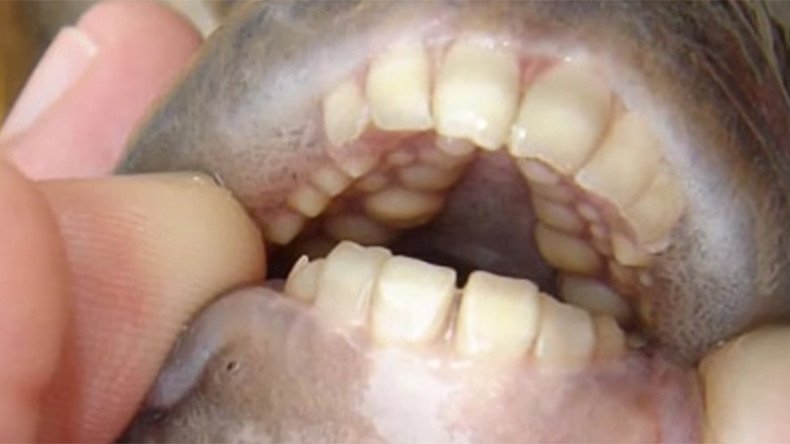‘Genitalia-eating human-toothed’ fish pulled from Michigan lakes (PHOTO)

A tropical fish rumored to feast on male genitalia is being dumped by pet owners into Michigan lakes, and conservationists aren’t happy about it.
The pacu fish is an all-devouring, or omnivorous, species native to South America and is closely related to the razor-toothed piranha.
According to the Michigan Department of Natural Resources, the month of July has become “synonymous with reports of anglers landing pacus” while fishing in the state’s lakes.
They suspect pet-owners are discarding the fish when their tanks are no longer able to house the growing creature.
While the one-meter (3.2ft) long fish can weigh up to 11kg (25lb), it is the river dweller’s frighteningly powerful jaws that make it distinctive in the underwater world. It’s gnashers have been described as "human-like” - square, blunt dentures designed to crush up a mixed diet of fruit, nuts and vegetation as well as shellfish and insects.
The fish’s surprise discovery in Michigan waters is not expected to harm the local environment, as they will likely die during the area’s severe winter. However, their impact may become more serious with climate change, warns Michigan’s wildlife department.
A statement by the natural resources department reveals pacu fish have been found in at least 27 states, adding that jettisoning the fish into local waterways is both inhumane and illegal.
“Pet release is almost never humane,” said Nick Popoff, manager of the DNR’s Aquatic Species and Regulatory Affairs Unit. “Pets released from confined, artificial environments are poorly equipped to fend off predators and may be unable to successfully forage for food or shelter.”
“In the worst-case scenario, released animals can thrive and reproduce, upsetting natural ecosystems to the degree that these former pets become invasive species.”
Rumors have circulated that the strange warmwater fish has a taste for chewing on testicles, however, there are no confirmed reports of it actually happening.
It appears the scare-story originated in 2013, when a Danish professor jokingly suggested in a press release that the pacu could mistake swimmer’s testicles for fruit floating in the water.
READ MORE: Rare ‘testicle-eating’ fish with human-like teeth found in New Jersey
Professor Peter Rask Moller was responding to reports about a fisherman catching the South American species off the coast of Denmark. He later told CNN that the remark was a “half-joke”.
“It is very unlikely that you would actually meet one here and that it would bite you,” he said. "I’ll keep my shorts on, though.”












